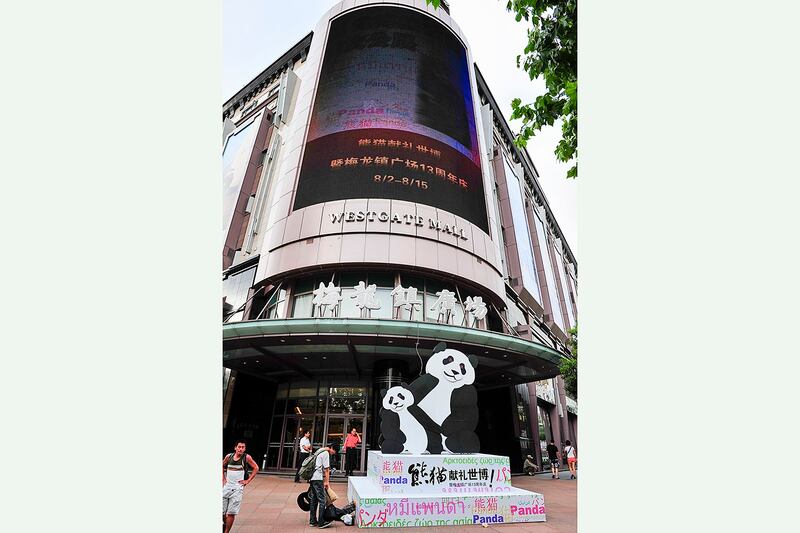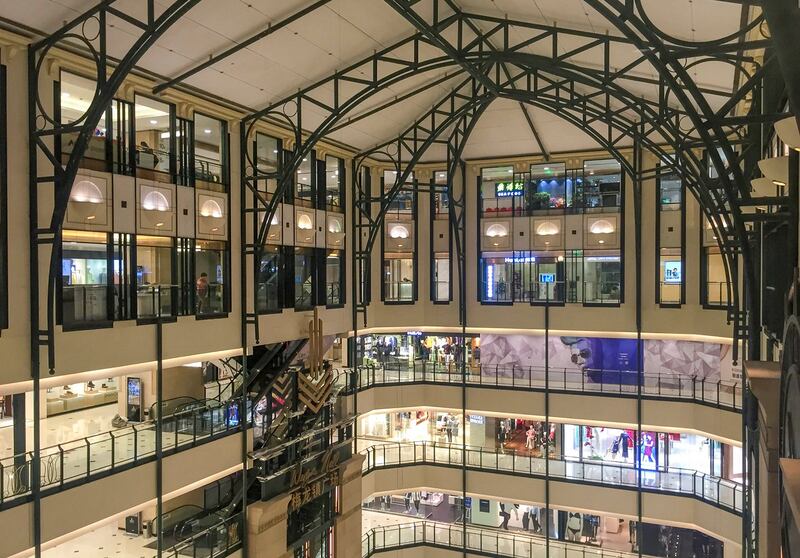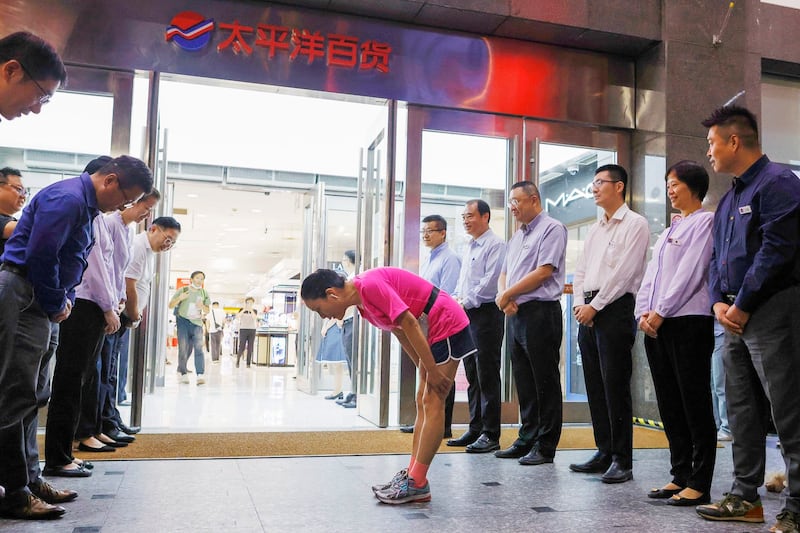A glitzy Shanghai shopping mall once packed with designer fashion stores is shutting down, leaving the U.S. Consulate's visa section the only occupants of a once-bustling building, staff told RFA Mandarin.
"Starting from August 1, all businesses except the U.S. Consulate will be closed," an employee who answered the phone at Shanghai's Westgate Mall said when contacted by Radio Free Asia on July 24.
The U.S. Consulate said it would continue to run its visa and immigration services from the 9th floor of the mall, on Shanghai's Nanjing Road shopping street.
"Please note, due to a planned renovation, other businesses and stores in Westgate Mall will cease operation beginning Aug. 1, 2024," the Consulate said in a notice on its official website, adding: "The Non-Immigrant Visa and American Citizen Services units will continue to operate."
The closures come amid an economic downturn that has seen nearly 7,000 retail outlets closed down in China during the first six months of this year despite ongoing efforts by the ruling Chinese Communist Party to boost economic growth by encouraging consumption.
One of the biggest tenants of the mall, Shanghai Westgate Isetan Department Store shut down at the end of June after its lease expired.

A resident of Shanghai who gave only the surname Hu for fear of reprisals said businesses are closing down all over the city, citing a recent trip to a building at the intersection of Nanjing Road and Tibet Road, where he said some two thirds of the restaurants had shut down.
"Nanjing Road is the top shopping street in the whole of China, maybe first or second in the whole of Asia," Hu said.
"There used to be a lot of foreigners around there, but there's hardly anyone in the malls these days -- they're dead," Hu said.
No money to spend
Chen Soong-hsing, an adjunct professor in China Studies at Taiwan's Chinese Culture University who lived and worked in Shanghai for three years, said the economic downturn has hit the city hard.
"To start with, we were worried about foreign capital leaving, but even Chinese companies can't stay in operation, and are moving overseas," Chen said.
"The rich are voting with their feet, and Shanghai was where the richest people in China were concentrated," he said.
The investment community platform PEDaily.com quoted incomplete statistics from Yilan Business as saying that in the first half of 2024, at least 6,882 stores in China announced they would close, including some in major chains like Walmart and Alibaba's Freshippo.

The 2024 China Consumer Trends Survey from international consulting firm McKinsey cited worries about unemployment or income instability, asset depreciation and debt as contributing to the dearth of consumer demand.
"Ordinary people just don't have any money to spend," Hu said. "Even some people in Shanghai who have some money daren't spend recklessly, and are dialing back their consumption."
Chen said that if the downturn is so clearly visible in Shanghai, a top-tier city, then the situation must be far worse in smaller cities across China.
He said the current leadership under Chinese Communist Party leader Xi Jinping has done little to assuage people's fears.
"The current group of leaders have no idea about how to deal with our current economic difficulties, so they continue to cut interest rates and stimulate liquidity," Chen said.
Hong Kong also hit
China announced unexpectedly on Thursday that its central bank would cut its one-year medium term policy loan lending rate by 20 basis points to 2.3%, the biggest rate cut since the ending of COVID-19 pandemic restrictions in 2022.
Meanwhile, a brief survey by RFA Cantonese found empty offices and piled up utility bills throughout a US$7 billion skyscraper in Hong Kong called The Center.
Several units were vacant when visited on July 24, with large numbers of unopened bills for water and other letters piling up outside the doors to individual units.
A notice posted on the door of one shuttered office once occupied by the asset management group Sanne Group Asia said the company had moved.
An office worker who gave only the surname Lee for fear of reprisals said the city's government is struggling to rekindle economic confidence.

"They're trying to find foreign investors who want to come back, but it's not easy," Lee said. "There is around 20% to 30% less [foreign investment] than before."
An IT worker in the same building who gave only the surname Tang for fear of reprisals said there are also fewer people in Hong Kong, following a mass exodus of middle-class families amid an ongoing crackdown on peaceful protest and political dissent.
"We have some vacancies in my office because some of our colleagues have emigrated," Tang said. "There are around 20 less of us than before."
Asked if he was worried, Tang replied: "Yes, we are, a bit, because it's affecting the economy."
"Everyone is a little worried about their future prospects," he said.
Downsizing
At the end of 2023, offices in The Center were renting for around HK$28,000 per square foot for a full-floor office in the middle levels of the building.
Similar spaces cost around HK$50,000 per square foot in September 2018, according to figures from the real estate company Centaline.

Simon Lee, an honorary teaching and research fellow at the Chinese University of Hong Kong Business School, said that while The Center alone may not be enough of a bellwether for the city's economy, he believes the current situation in Hong Kong is "somewhat unfortunate."
"Foreign investors are downsizing and in some cases withdrawing altogether," Lee said. "Chinese capital should be the main thing that is supporting the office market, but some Chinese investors have run into difficulties, and some haven't done a good job of managing risk."
"If Hong Kong were to get back its former economic momentum and go back to the situation we had in 2018, I think office buildings would be in huge demand again," he said. "But when will that day come?"
Translated by Luisetta Mudie.
